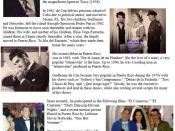A biography is often the view of a fan or a great admirer and is a very one sided experience, highlighting the persons achievements and not dwelling on the persons failures, for example:- `Son of a footballing fatherô is a biographical account of Malcolm Meninga told by John Mac Don. The text takes a very positive look at the life of Malcolm Meninga praising him on most accounts. throughout the whole biographical text we can not help but admire the physical and mental strength that Malcolm Meninga used to become a `man among menô.
The two most predominant attitudes that the reader is positioned to take towards Malcolm Meninga are sympathy and respect. The writer invokes sympathy, by highlighting his struggle to the top, the pain that he has endured when his life at home took a rapid down fall. One of the biggest reasons for this was when his fathers chest was crushed in a sawmilling accident that left him paralysed, this started a chain reaction of events, the first one was when his dad could not play or coach footy any more, this lead to boredom, which quickly led to drinking heavily.
When such behaviour persisted his mother decided that it was time for him to move out and brought him to the police academy. It is at this point where the writer starts to invoke respect for Malcolm Meninga, the way he lived without any parental guidance, and how he was criticised for being different or good at sports, not letting this affect him in any way.
One of the techniques that helped the writer to position the readers thoughts towards sympathy was the use of language, we find a prime example of language in the following sentence:- `At fifteen years of age, Malcolm Meninga was thrust in to a hard wide world of which he had no experience.ô Reading this sentence once tells the reader that Malcolm was left to stand on his own two feet prematurely, the start of the sentence `at fifteen years of ageô is a great example of section of detail. The use of language such as; `thrustô, `hard wide worldô and `no experienceô help suggest this to the reader. The connotations of thrust are negative and gives the whole sentence a negative feeling if we were to replace this word with another of the same meaning such as pushed the sentence would lose a lot of its intensity and would also lose some of its body becoming less expressive, failing to get the readers attention. the usage of `hardô reinforces `wide worldô and scores quite high on a scale of intensity, combining these three words, `hard wide worldô gives the reader the mental picture of a very unforgiving world a world that only accepts winners and if you are weak you will most defiantly perish. The next word is `no experienceô by putting this at the end of the sentence the writer has quite cleverly reinforced the fact that Malcolm was at the time considered weak and not ready to face his challenges, this enhances the sympathy factor, giving the reader the mental picture of a child abandoned due to circumstances that he had no control over.
The second technique that has been well utilised in this biographical text is structure. The text is structured in such away that the reader is called upon to have the maximum amount of respect for Malcolm Meninga. The writer does this by starting of the whole text with a teaser. The first three paragraphs tells us the main part of his life starting of with one of his biggest problems, being left to fend for him self at the age of fifteen, and then telling you he has become a man among men, implying that he has overcome these problems, after telling the reader the start and the end of the story in the first 3 paragraphs the writer goes into more detail starting at the beginning of Malcolm's life. In the following two paragraphs the writer tells the reader of how it was before his father had the accident, that life was very pleasant; in these paragraphs he includes the whole family, giving the reader some information about his mothers and fathers background. By doing so the writer is telling the reader that in the early years of Malcolm's life it was very enjoyable.
In the main body of the text the writer leaves out the rest of the family and focuses on Malcolm Meninga, the writer also starts to point out some of the more miner problems of Malcolm Meninga highlighting each one of these with an achievement, for example; `At high school I still got in to a couple of scraps because of my colour or my success at athletics.ô and then right after this sentence we are told; `I use to run. I never lost at school carnivals.ô by putting this achievement after the problem the writer invokes the readers respect for Malcolm Meninga.
In the concluding paragraphs the writer swings the biographical text back to the start of Malcolm Meninga's life telling the reader how life was after the sawmilling accident, how his dad stated to go out of control the writer tells this part in Malcolm Meninga's own words, he does this because Malcolm tells it in a very detached way, giving the reader the idea enhancing the readers respect.
Having read `Son of a footballing fatherô once and then straight after `Madonna starting outô I feel that `Son of a footballing fatherô was the more effective biography in conveying a clear impression of its subject due to the fact that is was written with more feeling where as Madonna starting out was more of a list of facts written with little feeling, a good example of this is in the first paragraph of Madonna starting out, it tells us that the subjects father was a strict man that she attended three different catholic junior schools and that she was a good pupil getting good grades, the writer does this with little feeling. Where as in Son of a footballing father, the first paragraph starts out with what it was like in the early years of the subjects life, saying that it was a happy experience and that due to a accident things went bad, using such words as happy fills the paragraph with feeling and tells the reader more about the subjects personality rather than a list of his or hers achievements. Due to these reasons, I feel that `Son of a footballing fatherô gives a clearer impression of its subject.





